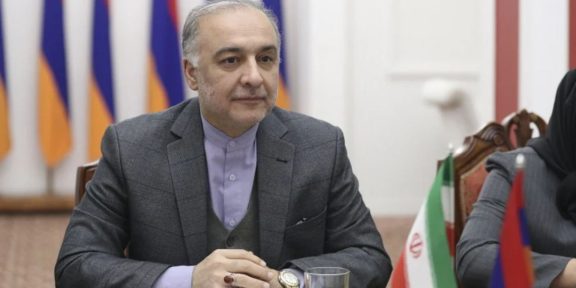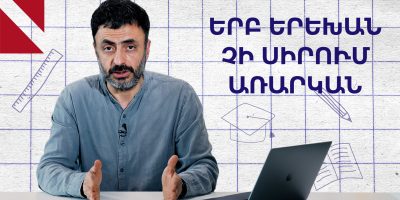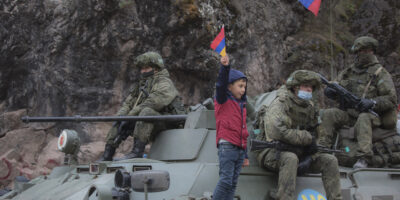 Agos, the Armenian bilingual weekly newspaper based in Istanbul, on the occasion of the 99th anniversary of the Armenian Genocide, published a series of letters written by well-known Armenians addressed to the Turkish people.
Agos, the Armenian bilingual weekly newspaper based in Istanbul, on the occasion of the 99th anniversary of the Armenian Genocide, published a series of letters written by well-known Armenians addressed to the Turkish people.
“I tell it to you as I tell it to myself: it is our duty to remember them, to tell their stories, to let the truth”. On the occasion of the 99th anniversary of the Armenian Genocide, Micheline Aharonian Marcom writes a moving letter to the Turkish people.
Truth does free us, just as lies blind us
Not to have seen it, yet inheriting it.
—Myuong Mi Kim
My first novel, Three Apples Fell From Heaven, takes place in the adjacent Ottoman towns of Harput and Mezre (now Elazig) in 1915 and 1917. That book is based, in part, on the life of my maternal grandmother, née Anaguil Demirdjian, who was born at the turn of the last century, and who, along with her four brothers and one sister, survived the Armenian Genocide. My grandmother and her siblings hid with a Turkish family, my great-grandfather’s business partner, for two years, thereby evading the death marches to Der Zor, until they could escape, first to Aleppo, and finally to Beirut where they settled, and where my mother was born and raised.
I myself was born in the Middle East, but raised in Los Angeles, my father’s hometown. From my mother I inherited a handful of sentences about my family’s history in Turkey, mostly about how my grandmother had saved the family, kept the children together when others would have separated them and put them into orphanages. From the few sentences I inherited I eventually (after considerable research and time) wrote my first novel—in some ways to know my grandmother’s story better (she died when I was just nine during another war: the Lebanese Civil War), and also, I think, to have a better understanding for some of the things which existed in me: the melancholy and sadness I had inherited. We, all of us, inherit stories from our families, and also, of course, from our nations. We inherit the ones told to us, and even, I think, the ones that are censored and untold, or denied. The untold stories show up like apparitions, ghosts, like small inklings, melancholies and even rages. I believe that in the telling of our stories without censorship we come to know and understand ourselves more fully, and, I think, we find a freedom: in that sense truth does free us, just as lies bind and blind us.
Perhaps this is why I love books so much, and why I am a writer, not only because books have the capacity to cross time and space and borders, but because they allow the reader’s consciousness, whomever he is and wherever he is, to be in the consciousness of a book’s: such a beautiful, radical act of pathos. It is in this way that each one of us can, however briefly, come to know another, for in some sense we become him while we read, we walk in his shoes.
Ninety-nine years ago my grandmother, citizen of the Ottoman Empire, a girl of thirteen, lost her parents and all of her extended family–they were either murdered or sent to the Der Zor; she lost her home; and two years later went into exile with her siblings. Perhaps you can imagine it. Today her granddaughter writes to you from California. I tell it to you as I tell it to myself: it is our duty to remember them, to tell their stories, to let the truth, as the writer Ralph Waldo Emerson once said, be “truly told,”—of the living, the dead, the disenfranchised, the silenced ones, the minorities, the denied, the exiled, and of a young Armenian girl from Anatolia named Anaguil.
Թուրքիայում լույս տեսնող «Ակօս» պարբերականում Հայոց ցեղասպանության 99-րդ տարելիցին կապակցությամբ հրապարակվել էր ամերիկահայ գրող Միշելին Ահարոնյան Մարկոմի նամակը՝ ուղղված թուրք ժողովրդին: Նամակի արևմտահայերեն տարբերակը ներկայացնում ենք ստորև:
Առաջին վէպս, Երկինքէն Երեք Խնձոր Ինկաւ, տեղի կ’ունենայ իրարու մօտ գտնուող Օսմանեան երկու քաղաքներու՝ Խարբերդի եւ Մեզրէի (Այժմ Էլազըղ) մէջ, 1915 եւ 1917 թուականներուն: Գիրքը մասամբ մը հիմնուած է մօրենական մեծ մօրս, ծնեալ Անակիւլ Տէմիրճեանի, կեանքին վրայ. ան ծնած է նախորդ դարասկզբին: Մեծ մայրս վերապրած էր ցեղասպանութիւնը իր չորս եղբայրներուն եւ մէկ քրոջ հետ: Մեծ մայրս եւ իր քոյր-եղբայրները թաքնուած էին թուրք ընտանիքի մը մօտ, որուն հայրը մեծ մեծ հօրս գործընկերն էր: Երկու տարի շարունակ կրցած են խուսափիլ դէպի Տէր Զօր տանող մահուան ճամբան ելլելէ, եւ յետոյ փախած են նախ դէպի Հալէպ, ապա դէպի Պէյրութ, ուր հաստատուած են, եւ ուր ծնած եւ հասակ առած է մայրս:
Ես ինքս ալ ծնած եմ Միջին Արեւելքի մէջ, բայց մեծցած եմ Լոս Անճելոս՝ հօրս քաղաքը: Մայրս զիս ժառանգ ձգած է մեծ թիւով յիշողութիւններ Թուրքիոյ մէջ մեր ընտանիքի պատմութենէն: Մեծ մասը մեծ մօրս ընտանիքը փրկելու մասին է, թէ ինչպէս ան զաւակները ի մի պահած է, մինչ ուրիշներ կը բաժնուէին, եւ զաւակները որբանոցներ կը դնէին: Այդ մի քանի յիշողութիւնները քով քովի դնելով եւ երկար պրպտումներ կատարելէ ետք առաջին վէպս գրեցի: Կարծեմ գրեցի աւելի լաւ հասկնալու համար պատմութիւնը մեծ մօրս, որ մահացած էր երբ ես միայն ինը տարեկան էի, ուրիշ պատերազմի մը ընթացքին՝ Լիբանանի քաղաքացիական պատերազմին: Կարծեմ գրեցի նաեւ հասկնալու համար իմ մէջս եղող կարգ մը բաներ, մելամաղձոտ եւ տարտամ վիճակները, որոնք ժառանգած էի: Մենք բոլորս պատմութիւններ կը ժառանգենք մեր ընտանիքներէն եւ անշուշտ մեր ազգերէն: Մենք կը ժառանգենք ինչեր որ պատմուած են մեզի, բայց կարծեմ նաեւ ինչ որ գրաքննուած են եւ մերժուելով գաղտնի մնացած են: Գաղտնի պատմութիւնները կ’երեւին տեսիլքներու պէս, ուրուականներու նման, որպէս փոքր նշմարներ, թախծութիւններ, եւ նոյնիսկ զայրոյթներ: Կը կարծեմ, երբ մեր գաղտնի պատմութիւնները կը պատմենք առանց հաշուեքննութեան, կը հասկնանք մենք մեզի աւելի բովանդակ ձեւով: Կը գտնենք ազատութիւն մը, եւ այդպիսով իրականութիւնը կ’ազատագրէ մեզ, ճիշդ ինչպէս որ սուտերը կը կապեն ու կը կուրացնեն մեզ:
Թերեւս այս է պատճառը, որ գիրքերը շատ կը սիրեմ եւ գրող մըն եմ: Ոչ թէ պարզապէս քանի որ գիրքերը կարողութիւն ունին ժամանակի եւ տարածութեան սահմանները անցնելու, այլ քանի որ ընթերցողին գիտակցութիւնը -ով որ ալ ըլլայ, ուր որ ալ գտնուի ան- բաժին ըլլայ գիրքին գիտակցութենէն: Սքանչելի եւ ծայրայեղական յուզականութիւն մը: Այսպիսով է, որ մեզմէ իւրաքանչիւրը կրնայ, թէկուզ կարճաժամկէտ ձեւով, ճանչնալ ուրիշ մը, մինչ կը կարդանք ձեւով մը դառնալ ան, հասկնալ զայն ամբողջովին:
Իննսուն ինը տարի առաջ, մեծ մայրս, Օսմանեան Կայսրութեան քաղաքացի տասներեք տարեկան աղջիկ մը, կը կորսնցնէ իր ծնողները եւ բոլոր ընտանիքը, որոնք կա՛մ սպաննուած էին եւ կամ ղրկուած էին Տէր Զօր: Ան կը կորսնցնէ իր տունը եւ երկու տարի ետք քոյր-եղբայրներուն հետ գաղթական կը դառնայ: Թերեւս կարենաք պատկերացնել: Այսօր իր թոռնիկը ձեզի կը գրէ Քալիֆորնիայէն: Ձեզի կ’ըսեմ, ինչպէս որ պիտի ըսեմ ինքզինքիս, մեր պարտականութիւնն է անոնց յիշել, անոնց պատմութիւնները կրկնել, որ իրականութիւնը «իսկապէս ըսուի», ինչպէս պիտի ըսէր հեղինակ Ռալֆ Ուալտօ Էմէրսըն: Յիշել պատմութիւնները ողջերուն, մեռելներուն, անիրաւուածներուն, լռեցուածներուն, փոքրամասնութիւններուն, մերժուածներուն, բռնագաղթուածներուն եւ Անատոլիայէն եկած պզտիկ հայ աղջկայ մը, որուն անունը Անակիւլ է:
http://www.agos.com.tr/diasporadan-mektubun-var-turkiye-7057.html















